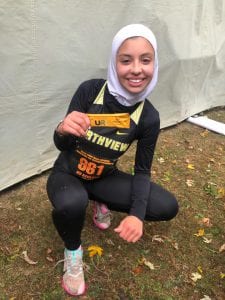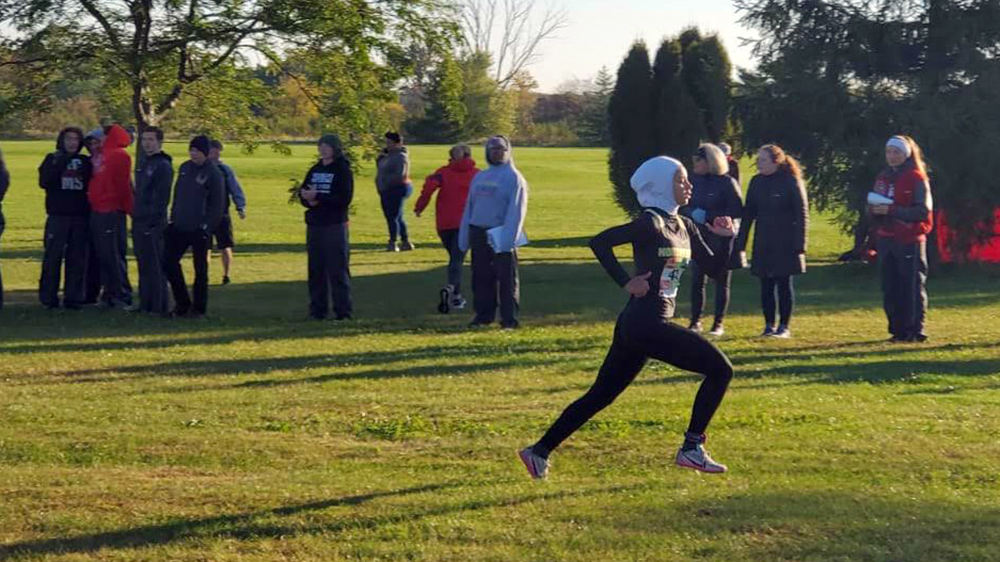(RNS) — In October, a 16-year-old cross-country runner made headlines across the country when her fastest 5K of the season was disqualified from a local district meet because she ran while wearing a hijab.
One week after her disqualification, Noor Alexandria Abukaram was back at the finish line with a new personal record, once her coach had acquired a waiver for her to wear a hijab for the race. Last month, after the teen won support from prominent Muslim figures including Olympic medalist Ibtihaj Muhammad and U.S. Rep. Ilhan Omar, officials say they changed uniform regulations to allow student athletes to compete in religious headwear without requiring waivers.
You may unsubscribe from any of our newsletters at any time.
But Abukaram, a junior at Sylvania Northview High School in eastern Ohio, isn’t finished yet. The athlete aims to remind the world that her case was no anomaly with a new initiative called Let Noor Run.
“Unfortunately, what happens is that people see this happened to me here in Toledo and decide ‘OK, yeah, this happens like once in a decade,’” Abukaram said. “But it’s not. It happens every single day to Muslim athletes around the country. This is bigger than me.”
In its early days, the organization will focus on educating the public about the discrimination Muslim women face in sports and advocating for policy changes that promote inclusivity.

Later, she hopes to offer legal aid and media attention to “help expose the many faces of discrimination in sports,” Abukaram said — whether it’s a Muslim woman swimming in a burkini, or a black woman competing with natural hair, or a Sikh man wrestling in a turban. The teen has recruited a lawyer and press manager to her team in preparation.
Let Noor Run will kick off with an event on Friday (Jan. 24) at Lourdes University’s Franciscan Center in Sylvania, Ohio. Abukaram will speak on a panel alongside fellow hijab-wearing athletes Bilqis Abdul-Qaadir, who was the first Muslim woman in a headscarf to play NCAA Division I basketball, and Minnesota-based teen boxer Amaiya Zafar, who spent two years fighting for a waiver to wear a hijab while boxing.
Abukaram has not yet met her fellow speakers in person.
But they already share a close bond, she said.
“We’re three different people, from three different parts of America, sharing our stories,” Abukaram said. “We have this personal connection already, because we’ve all been through discrimination in the sports industry. And now we’ve all decided we want to make this industry better.”
The event will offer a screening of the documentary Life Without Basketball, which traces how rising basketball player Abdul-Qaadir’s life was derailed by the International Basketball Federation’s ban on religious headgear.
Abdul-Qaadir broke an 18-year Massachusetts record to become the state’s highest all-time high school scorer before she went on to play for the University of Memphis and Indiana State University.
But the ban denied Abdul-Qaadir the chance to go pro.
Her dogged activism eventually succeeded and the federation agreed to amend the rules. But the change did not go into effect until she aged out of the game.
Now, Abdul-Qaadir runs “Muslim Girls Hoop Too,” offering motivational speeches and leading Muslim girls’ basketball clinics around the country, while working as an athletic director for a Toronto-area Muslim community centre and a Memphis Islamic school. This spring, she will offer her first basketball camp in Canada.
“When they see that documentary and hear us, I hope people leave with an understanding of how personal it is,” Abukaram said. “It’s not just a game. It’s a person’s life. We can’t just move on.”
Abdul-Qaadir and Abukaram will be joined on stage by Zafar, who in 2016 was forced to forfeit her first competitive boxing match because she refused to remove her hijab, long-sleeved shirt and long pants. After a two-year battle, she won the right to a religious exemption from USA Boxing’s uniform regulations.
“It’s not just a game. It’s a person’s life. We can’t just move on.”
Abukaram’s high-profile disqualification seems to have led to a policy change, as well.
When Abukaram ran the Oct. 19 race, she wore her usual uniform: a Nike hijab, Nike leggings and a long-sleeved Under Armour shirt with the team’s jersey layered over the top.
She had never been asked to submit a waiver for any previous races, but Ohio High School Athletic Association officials told media they were simply enforcing their uniform regulations by disqualifying her.
The association’s rulebook banned most head coverings and caps and required anyone who needed an exemption for any reason to request a waiver beforehand.
But on Dec. 5, the board of directors voted to amend the uniform regulations regarding headwear. A waiver is no longer required, association spokesman Tim Stried confirmed to Religion News Service.
Abukaram told RNS that she has not heard about any policy change. She has not been asked for a waiver since the end of the cross-country season, and track season has not yet started up again.
The move came after her disqualification was covered by HuffPost, Sports Illustrated, ESPN, The Washington Post, BBC, Good Morning America, Teen Vogue and dozens of other outlets.
“Before all of this, I felt crushed, betrayed by a sport that I have grown to love so dearly,” Abukaram wrote on Facebook in October. “I was scared with apprehension that my coach and teammates would be negatively affected by all the media … but I knew I had to do something so that no other student athlete competing in hijab would ever endure the humiliation and anguish that I went through last weekend.”
And that work doesn’t stop as long as anyone needs a waiver to stay true to their faith while playing sports, she said.












